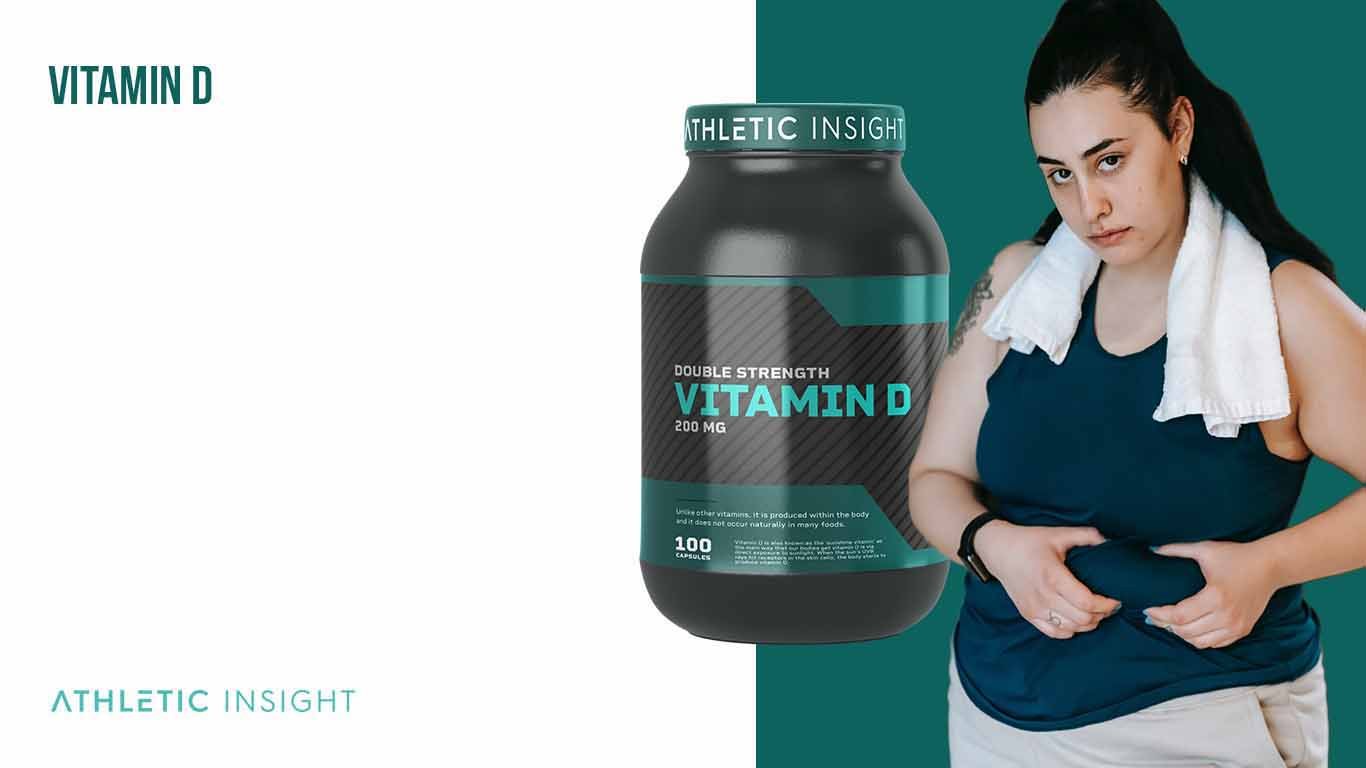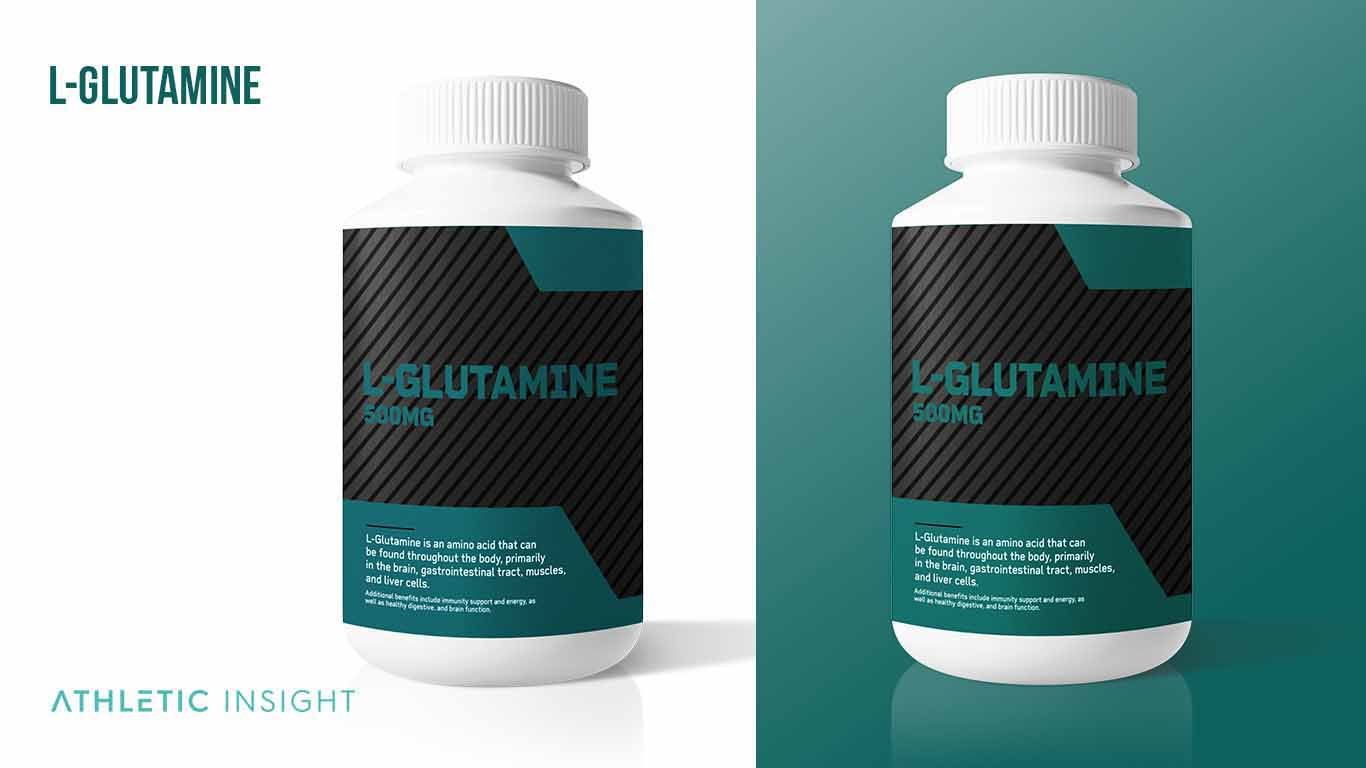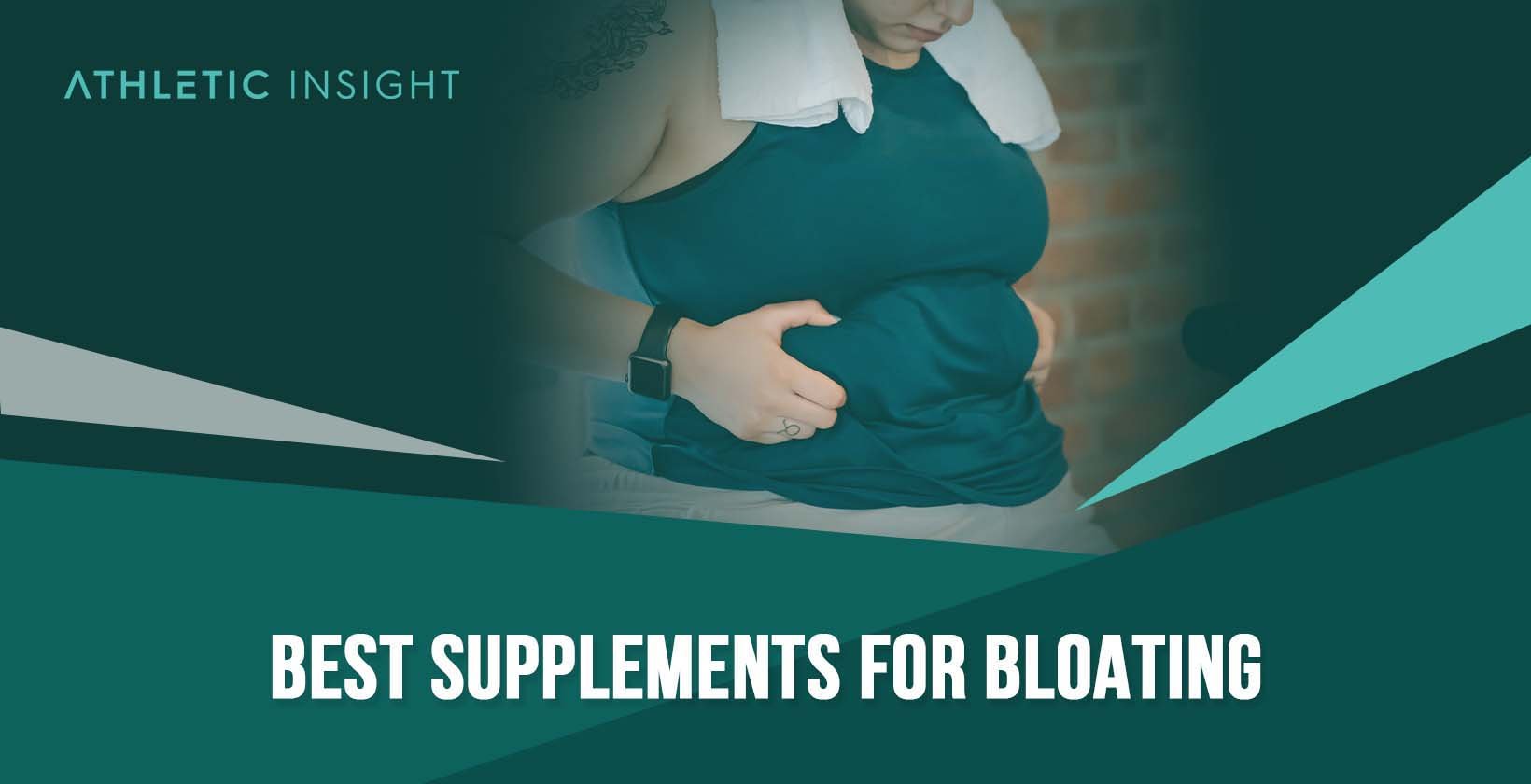Bloating is a common condition where the stomach feels overly full and heavy. The best supplements for bloating aim to combat this condition by reducing gas within the digestive tract and swelling in the belly.
The best supplements for bloating must meet several criteria, including proven abilities to reduce gas, inflammation, and swelling within the stomach and intestines. Therefore, one of the most reliable ways to compare these supplements is to analyze how they reduce bloating.
After all, the best supplements for bloating tend to interact with the body in unique ways, either by increasing the rate of digestion, boosting intestinal mucus production, or correcting nutrient deficiencies that can contribute to bloating.
Athletic Insight Top 3 Products
- Vitamin D >>> Best Vitamin D Option
- Probiotics >>> Best Probiotic Option
- L-Glutamine >>> Best L-Glutamine Option
Understanding the cause of your bloating can help you select an effective supplement to help you combat bloating. Some of the best supplements for digestion and bloating include:
- Vitamin D (Best Overall)
- Probiotics (Best for Reducing Gas)
- L-Glutamine (Best for Intestinal Healing)
- Ginger (Best for Increasing Digestion Rate)
- Psyllium Husk (Best for Reducing Water Bloat)
- Peppermint Oil (Best Bowel Relaxant)
- Prebiotics (Best for Increasing Good Gut Bacteria)
- Slippery Elm (Best for Increased Intestinal Mucus)
- Cinnamon Oil (Best for Reducing Stomach Inflammation)
1. Vitamin D
Vitamin D (calciferol) is an essential nutrient that increases the bioavailability of calcium, magnesium, and serotonin. There are two types of vitamin D used in supplements; Vitamin D2 (ergocalciferol) and Vitamin D3 (cholecalciferol).

Vitamin D2 is the less potent variety, making it a safer alternative to vitamin D3. That said, the higher absorption rate of vitamin D3 may make it the better option for those with severe vitamin D deficiencies or individuals looking to ingest smaller doses of vitamin D.
Vitamin D increases the absorption rate of several crucial nutrients, including calcium and magnesium. Increased vitamin D levels can also impact the availability of serotonin, making it a vital component of mood regulation.
This vitamin can also protect the digestive tract from bacteria that may cause stomach upset and bloating. Low vitamin D levels are linked to increased inflammation throughout the digestive system, so consuming vitamin D supplements may decrease inflammation that causes bloating.
Taking a vitamin D supplement can help reduce bloating and stomach upset. Vitamin D supplements may also help improve bone health, increase energy levels, and regulate your mood.
Vitamin D deficiency is a common condition primarily affecting photosensitive individuals and those who spend most of their day indoors. In addition, nutrient-poor diets, age, and ailments (like Crohn’s disease) can also lead to vitamin D deficiency.
Taking a supplement to correct low vitamin D levels is a far safer solution than spending time outdoors, as excessive sunlight exposure can increase the risk of developing melanoma (skin cancer) and sunstroke (heat exhaustion).
Consuming too much vitamin D can increase bloating and digestive discomfort. Excessive vitamin D intake may also result in dehydration, constant thirst, and nausea. The recommended daily intake (RDI) of vitamin D is 25 mcg to 100 mcg (400 IU to 800 IU). It’s generally safe for adults to consume up to 2000 IU of vitamin D per day.
Nature Made, Nature’s Bounty and HUM Nutrition are the top three vitamin D supplement brands. A container of vitamin D supplements costs $7 to $60. The most affordable options often contain between 30 and 90 tablets or capsules, while the priciest options contain up to 360 tablets or capsules.
2. Probiotics
Probiotics are healthy bacteria that flourish in healthy digestive systems. But these bacteria are found in low numbers in those suffering from digestive conditions, including bloating.
Consequently, consuming probiotic supplements can help reduce bloating and stomach discomfort. The most beneficial strains found in probiotic supplements include:
- Lactobacillus
- Bifidobacterium
- Bacillus
Some probiotic supplements are shelf-stable, while others must be refrigerated to remain viable. Generally, refrigerated options are more effective, but they’re also pricier.
Probiotic supplements can help replace beneficial bacteria in the gut that may have been destroyed by poor dietary habits, antibiotic use, and digestive conditions. These supplements contain live bacterial colonies that can flourish in the intestines, resulting in healthier digestion.
Consuming probiotic supplements can reduce symptoms associated with irritable bowel syndrome (IBS), bloating, and constipation. Probiotic supplements may also improve a person’s immunity and reduce digestive inflammation.
Probiotic supplements can increase bloating and flatulence, but these effects are typically temporary. Repeated daily consumption can help decrease the risk of developing these symptoms.
Adults can consume up to 20 billion units (also called colonies or organisms) of probiotics each day. The maximum dosage for children is 10 billion units.
The top three brands of probiotic supplements are Physician’s Choice, Culturelle, and Garden of Life. Probiotics can be costlier than other bloating supplements. Refrigerated probiotic soft gels and capsules tend to be the most expensive options.
Room-temperature probiotic supplements typically cost as low as $15 per 120 tablets, but refrigerated varieties can cost as much as $60 per 90 capsules.
3. L-Glutamine
L-glutamine is an amino acid. Proteins throughout the body are composed of amino acids, including glutamine. Trauma, illness, and hereditary disorders can contribute to low L-glutamine levels, resulting in a weaker immune system.

Fortunately, L-glutamine supplements can help correct these issues. Individuals with damaged intestinal linings (like those with Crohn’s disease) can benefit from consuming L-glutamine supplements.
Taking L-glutamine supplements can reduce the adverse impact of stress on the immune system. This amino acid can also aid in digestive healing by reducing discomfort associated with damaged intestinal linings (intestinal villi).
L-glutamine supplements for bloating can reduce stomach upset and discomfort and boost the immune system’s ability to heal digestive tissue.
Consuming too much L-glutamine can worsen digestive issues, resulting in nausea and abdominal pain. Excessive L-glutamine intake can also lead to rapid heartbeat, lightheadedness, headache, cold extremities, and skin rash.
A dosage of up to 6 grams (6000 milligrams) of L-glutamine is safe for most adults. However, those with celiac disease, Crohn’s disease, or other digestive conditions may need a higher daily dosage. Therefore, it’s vital to consult your physician to determine an appropriate dosage.
The top three brands for L-glutamine supplements are Optimum Nutrition, Life Extension, and Pure Encapsulations.
L-glutamine supplements are generally pricier than other supplements for digestion, though there are low-cost varieties available. The lowest-priced L-glutamine supplements cost $5 per 100 capsules. But the average price per bottle is about $20 (per 120 to 240 capsules).
4. Ginger
Ginger plants have large, tuberous roots. These roots are often harvested, dried, and crushed into a fine powder. Like many of the best supplements for digestion, ginger has been used since ancient times.
Ginger is often added to meals for flavoring, but some add it to water to form a stomach-friendly tonic. For example, ginger ale (containing natural ginger) is often recommended to those suffering from nausea or stomach upset.
Ginger root has anti-inflammatory properties and contains antioxidants. As a result, it’s often used to reduce bloating, inflammation, and nausea.
Ginger may also accelerate digestion, ensuring food doesn’t settle in the digestive system for extended periods.
Consuming ginger root supplements can boost the health of your immune system, help you digest food more quickly, and reduce stomach inflammation. Ginger root may also lessen nausea and discomfort associated with bloating.
Consuming an excessive amount of ginger root each day can worsen digestive issues. Common side effects include heartburn, dry mouth, and diarrhea.
Ginger root supplements should be taken with meals, and adults can safely consume between 1 gram and 4 grams daily. However, these supplements aren’t safe for children under 2.
The top three brands of ginger supplements are Nature’s Bounty, Nature’s Truth, and Nature’s Way. The price of ginger root supplements varies depending on the brand, capsule quantity, and dosage. That said, ginger supplements cost $10 to $25 per container.
5. Psyllium Husk
Psyllium is a plant with traditional medicinal uses. The seeds of this plant have fibrous exteriors (husks) that are crushed to form a powder. This powder absorbs water, making it a worthwhile option for those suffering from water-related bloat.
When psyllium husk passes through the digestive system, it becomes a water-rich gel that coats the interior of the intestines. This substance keeps the digestive tract well-hydrated and protected from harmful bacteria.
Psyllium husk supplements can improve digestion and reduce digestive discomfort. But these supplements may also help individuals maintain healthy blood sugar levels and lower cholesterol levels.
Some people may be allergic to psyllium husk. Those with allergies to this plant-based substance may experience difficulty breathing, nausea, or itching after consuming psyllium husk supplements.
Adults can consume up to 15 grams (15,000 milligrams) of psyllium husk daily. Psyllium husk supplements should be taken with meals (up to three times per day). The maximum daily dosage for children is about 5 grams.
The top three brands for psyllium husk supplements are NOW Foods, Sunergetic Supplements, and Yerba Prima.
The price for psyllium husk supplements is slightly higher than the average price for other digestive supplements. A container costs between $12 and $32, depending on the brand, dosage, and capsule quantity.
6. Peppermint Oil
Peppermint oil is derived from peppermint plants. This oil is also found in peppermint candies. This mint has been used to combat stomach upset for decades and is also popular for its aromatherapeutic effects.

When choosing a peppermint oil supplement to combat the symptoms of bloating, it’s crucial to select a food-safe capsule. Essential peppermint oil isn’t designed for internal use and can be dangerous when consumed.
Additionally, peppermint oil sold in grocery stores may contain alcohol, making them unsuitable for direct consumption.
There are few scientific studies focused on the effects of peppermint oil. However, people have used peppermint to alleviate digestive upset since ancient times. As such, the effects of peppermint oil are primarily anecdotal.
Taking peppermint oil supplements may help reduce digestive inflammation and discomfort, helping treat bloating symptoms. This substance can be particularly beneficial for those with irritable bowel syndrome (IBS) when consumed safely. Peppermint oil supplements may also reduce nausea.
When consumed excessively, peppermint oil supplements can exacerbate digestive discomfort. Taking too much peppermint oil every day can result in heartburn, abdominal pain, excess salivation, and nausea.
Adults can safely consume up to 50 mg of peppermint oil per day. However, exceeding this limit can increase the risk of experiencing unwanted side effects. The top three brands of peppermint oil supplements are Heather’s Tummy Care, Best Naturals, and NOW Foods.
Peppermint oil supplements typically cost between $10 and $40 per container. Supplements with higher dosages or additional stomach-soothing ingredients are often costlier than options with smaller dosages of pure peppermint oil.
7. Prebiotics
Prebiotics are a form of fiber. They promote beneficial bacteria in the stomach and intestines (probiotics), increasing the effectiveness of probiotic supplements.
Many foods contain prebiotics. Garlic, onions, and asparagus are familiar natural sources of prebiotics, and dried, powdered versions of these ingredients are often found in prebiotic supplements.
Consuming prebiotic supplements or foods high in prebiotic fibers can improve the effectiveness of probiotic supplements. These substances feed healthy bacteria in the gut, keeping beneficial strains plentiful.
Some ingredients that contain prebiotics (like onions and garlic) also have anti-inflammatory, antifungal, and antioxidant qualities.
The primary benefit of prebiotics is that they increase the health of beneficial bacteria in the gut (probiotics). As such, consuming prebiotics may result in reduced stomach inflammation, decreased bloating, and Improved immunity.
Consuming excessive prebiotic supplements or prebiotic-containing foods can increase stomach upset and discomfort. Common side effects include bloating, Increased flatulence, and constipation.
Prebiotics should be used in conjunction with probiotics for maximum effectiveness. Adults can safely consume up to 5 grams (5000 milligrams) of prebiotics per day.
The top three brands of prebiotic supplements are Dr. Tobias, Align Probiotic, and BioSchwartz. Prebiotic supplements are often more expensive than other supplements for digestion and bloating. The average price per container is $20, but some varieties can cost up to $50 per container.
8. Slippery Elm
Slippery elm (Ulmus rubra) is a type of tree. It has traditional medicinal uses, though modern science has confirmed that consuming this plant could benefit those suffering from inflammation and digestive upset.
The bark harvested from this tree is dried for use in capsule-based supplements. However, some supplement brands distill the bark into an oil. Measuring liquid doses is more challenging than consuming a pre-measured quantity, so taking a capsule or tablet may be safer.
Slippery elm gets its name from the mucosal nature of its exposed bark. The slippery consistency may promote increased intestinal mucus, helping to reduce digestive inflammation and discomfort.
Several benefits are associated with slippery elm consumption. Some of the most notable benefits include reduced bloating, decreased digestive discomfort, improved throat health, and lessened heartburn.
Slippery elm supplements may cause nausea, particularly when consumed in large quantities. But there are few severe side effects associated with consuming this substance.
Adults can safely consume up to 1500 mg of slippery elm per day. Dosages should be confined to 300 mg to 500 mg, with adults taking the supplements three times daily.
Consult with your physician before administering slippery elm supplements to children.
The top three brands of slippery elm supplements are Swanson Vitamins, NOW Foods, and Horbäach Health. Slippery elm supplements are budget-friendly, with capsules and tablets typically costing between $7 and $15 per container (60 to 200 capsules per container).
9. Cinnamon Oil
Cinnamon is a spice from dried tree bark (from Cinnamomum verum or Cinnamomum cassia trees). This bark is ground in a fine powder, making it easy to add to meals and desserts.
People have used cinnamon medicinally for hundreds (potentially thousands) of years to treat abdominal discomfort, diarrhea, and lack of appetite. In addition, modern scientific research has proven several benefits associated with cinnamon consumption.
Cinnamon oil is typically a combination of cinnamon powder and a food-safe carrier oil like olive oil. However, some cinnamon oils are created via steam distillation. There are two kinds of cinnamon oil:
- Cinnamon leaf oil
- Cinnamon bark oil
These oils aren’t designed for internal use (consumption) but are intended for aromatherapeutic use. Dried cinnamon powder supplements are the food-safe equivalent.
Cinnamon’s biological effects are varied. For example, this substance is rich in antioxidants, which may help boost immune system health.
Cinnamon can also lower blood sugar levels and reduce inflammation. In addition, Cinnamon’s anti-inflammatory properties make it one of the best supplements for digestion and bloating.
Consuming cinnamon supplements can help you reduce inflammation associated with bloating. However, cinnamon can also lower blood sugar levels, reduce the risk of heart disease, and combat fungal infections.
Consuming too much cinnamon can be harmful to your health. Side effects associated with excessive cinnamon oil consumption include decreased liver and kidney function and permanent damage to the kidneys and liver.
Due to the potential adverse effects of consuming cinnamon oil, it may be better to consume dried cinnamon powder supplements.
Consuming 2.5 grams (2500 milligrams) or less is safe for most adults. However, doses should be far less for children and those with pre-existing liver or kidney conditions.
Consuming essential cinnamon oil can be dangerous. If you’re eager to enjoy the anti-bloat benefits of cinnamon, it’s far better to invest in a supplement containing dried cinnamon powder.
Nature’s Nutrition, NutriFlair, and Vimerson Health are the top three brands for cinnamon supplements. Cinnamon supplements are comparatively affordable, often costing $3 per 180 capsules to $30 per 90 capsules. Like other supplements, prices vary depending on brand and dosage.
What Are Bloating Supplements?
Bloating supplements are pills, capsules, or tablets containing substances known to ease bloating. These supplements affect the body in a multitude of ways.
Some of these effects include correcting nutrient deficiencies, reducing inflammation in the belly, decreasing gas in the digestive system, and absorbing excess water in the gut. So naturally, the anti-bloating effects differ based on the exact supplement.
What Is the Importance of a Bloating Supplement?
Bloating is a condition that can cause discomfort, stomach upset, and excessive flatulence. These symptoms can impact a person’s day-to-day life, making some tasks (such as exercise) more challenging.
Bloating supplements can alleviate the symptoms of bloating, reducing the symptoms associated with bloating. As such, bloating supplements may help individuals feel healthier and more capable.
Who Can Take Bloating Supplements?
Anyone can take bloating supplements, but the most suitable anti-bloating supplement for an individual varies depending on the cause behind that person’s bloating.
For example, individuals experiencing bloating and constipation may find that slippery elm supplements are far more effective than vitamin D supplements. Conversely, those with vitamin D deficiency may reduce bloating by increasing their vitamin D intake.
Additionally, most supplements are inappropriate for infants (children younger than one year). Before administering a bloating supplement to a child, check the specific supplement’s recommended age range to ensure that the product is suitable for children.
When Should I Take Bloating Supplements?
The best time to take supplements is during meals. Consuming bloating supplements before or after meals may increase stomach discomfort and nausea.
Besides, consuming anti-bloating supplements during a meal increases the rate at which the body digests and absorbs the supplements. As such, taking bloating supplements during meals may increase their effectiveness and help individuals experience relief more quickly.
How To Choose the Best Supplement for Bloating?
To choose the best supplement for bloating, you’ll want to consider the following.
- Determine the cause of your bloating
- Select a supplement that directly addresses that cause
- Choose a supplement brand that fits your budget and personal preferences (vegan, vegetarian, gluten-free, etc.)
You can use this step-by-step list to choose the best supplement for bloating.
Where To Buy the Best Supplement for Bloating?
You can buy the best supplement for bloating online. By buying online, you’ll have access to the broadest range of options, ensuring that you’ll find a supplement that addresses the cause of your bloating and one that falls within your price range.
Supplements for bloating generally cost between $5 and $60. Price varies by brand, supplement quantity, and supplement milligram count. The supplement delivery type (capsule, tablet, powder) also influences the price, with tablets often costing less than capsules or powders.
Are Bloating Supplements Affordable?
Yes, bloating supplements are affordable. The average price for a bottle of bloating supplements is about $12. This equates to an expense of $6 to $12 per month (depending on the supplement quantity).
Naturally, taking multiple types of bloating supplements is more costly than consuming a single variety. There are several affordable supplements for bloating, but the best supplements for you depend on the cause of your bloating.
For example, those with a vitamin D deficiency may find that taking vitamin D supplements significantly reduces bloating. However, individuals with irritable bowel syndrome (IBS), celiac disease, or Crohn’s disease may find that cinnamon oil supplements are the best option to combat bloating.
Fortunately, there are several supplement brands to choose from, ensuring that you can find a suitable supplement that meets your budget and preferences.
Is Taking a Supplement for Bloating Necessary?
No, taking a supplement for bloating isn’t always necessary. Lifestyle changes, such as consuming fewer carbonated beverages, exercising more often, and eating more slowly, can reduce the risk of bloating.
However, supplements to help digestion can be a practical and effective anti-bloating solution for those with a vitamin D deficiency, gastrointestinal disease, or poor diets.
Does Taking Supplements Make You Bloated?
Yes, taking some supplements can make you bloated. The supplements that cause bloating include fiber and iron supplements. Taking multivitamins that contain fiber and iron can also lead to bloating.
Conversely, other supplements (vitamin D, cinnamon oil, slippery elm, etc.) can relieve the symptoms of bloating and help prevent bloating.



